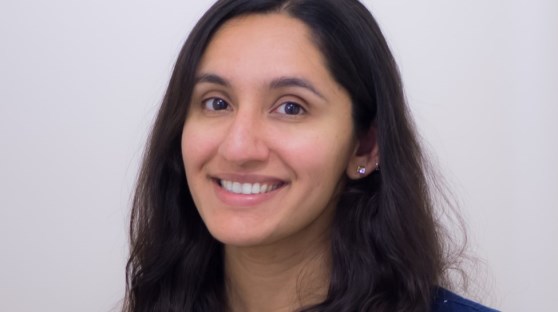
Chaitali Anand wants to predict the future, or at least pinpoint when a person's memory may decline in the future.
"Protecting a healthy brain makes more sense than fixing a broken one," she said.
Anand is a fourth-year doctoral candidate in the Wayne State University School of Medicine's Translational Neuroscience Program based in the Department of Psychiatry and Behavioral Neurosciences. She will use a two-year, $80,956 pre-doctoral fellowship from the National Institute on Aging of the National Institutes of Health to better understand normal cognitive aging to aid in the pursuit of a cure for dementia. The grant supports tuition and stipend.
"My goal is to assess age-related variation in glutamate in healthy young and older people who perform a simple memory task - learning association between common objects and places - as a potential biomarker of impending cognitive disturbances in aging," she said. "If my hypothesis is proven right, it might contribute to designing and testing of better targeted interventions to mitigate memory decline."
The most prominent neurochemical player in memory is glutamate, the most common excitatory neurotransmitter in the brain. Tracking changes in glutamate during the process of memory encoding may provide a sensitive early marker of memory dysfunction and allow early intervention with a greater hope for success in alleviating or delaying dementia.
"A sensitive non-invasive method of assessing changes in brain glutamate in live humans has been developed by one of my mentors, Jeffrey Stanley, Ph.D. at Wayne State University. This method, based on an MRI technique called proton magnetic resonance spectroscopy, is at the core of my project," she said.
Anand is mentored by Naftali Raz, Ph.D., professor of Psychology and director of the Life-Span Cognitive Neuroscience Program at the WSU Institute of Gerontology, and Dr. Stanley, who is professor of Psychiatry and Behavior Neurosciences and director of the Translational Neuroscience Program.
While life expectancy has increased in the last 50 years, the benefits of living longer are compounded by an increase in incidences of age-related neurodegenerative disorders, such as Alzheimer's disease. "One of the key issues in questions in the search for a cure of AD is determining the optimal timing of the intervention. Most experts agree that the earlier, the better and some explain the lack of success in finding the cure an inability to intervene at the earliest possible stage of the disease," she said. "Neurodegenerative disorders that lead to cognitive decline culminating in dementia are not sudden events. They develop slowly and have a prolonged course. The exact timing of onset of decline remaining uncertain. Therefore, identifying the markers of cognitive decline at the earliest possible time is an important goal."
She was awarded the competitive F31 grant for the project, "Age-related differences in hippocampal glutamate modulation during associative learning: An in vivo proton functional magnetic resonance spectroscopy (1H fMRS) study."
Her dissertation project is interdisciplinary, involving neuroimaging, statistical modeling and experimental design with respect to cognitive aging. "This fellowship will allow me to take advantage of various training opportunities. This pre-doctoral training will prepare me well for a postdoctoral position, which will allow me to research the neurochemical mechanisms contributing to cognitive deficits," Anand said. "In developing my future research program, I will extend the results from the proposed study to examine variations in glutamate modulation in participants with Alzheimer's disease and other dementias, and conduct longitudinal investigations to elucidate the time course of age-dependent changes in glutamate modulation."
Anand spent hours reading literature and putting the grant proposal together with the help of her mentors. "I feel very humbled that the NIH considered my ideas worth funding," she added. "I feel even more motivated to do aging research and understand the process of normal aging, which affects every single person."
The grant number for this award is F31AG058420.